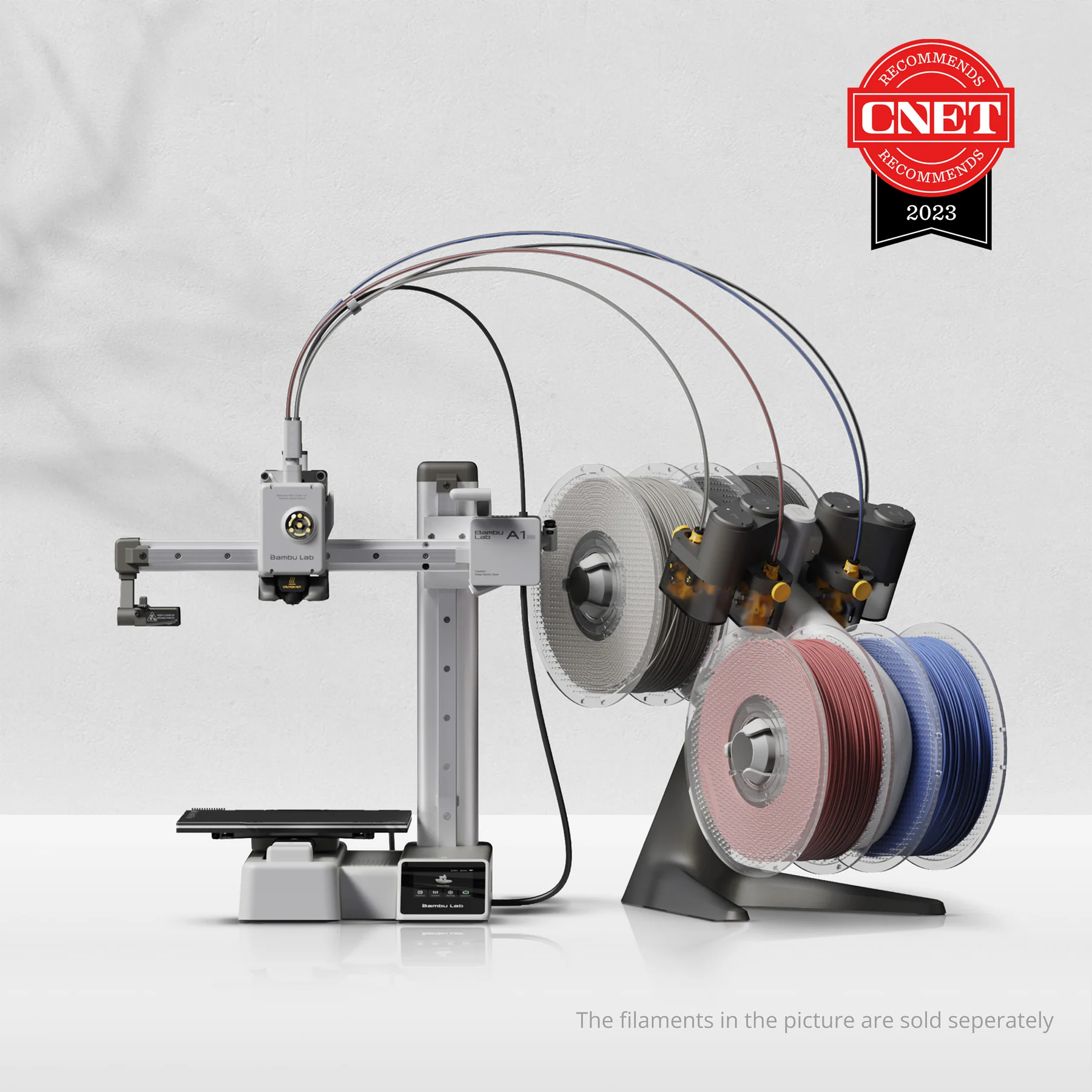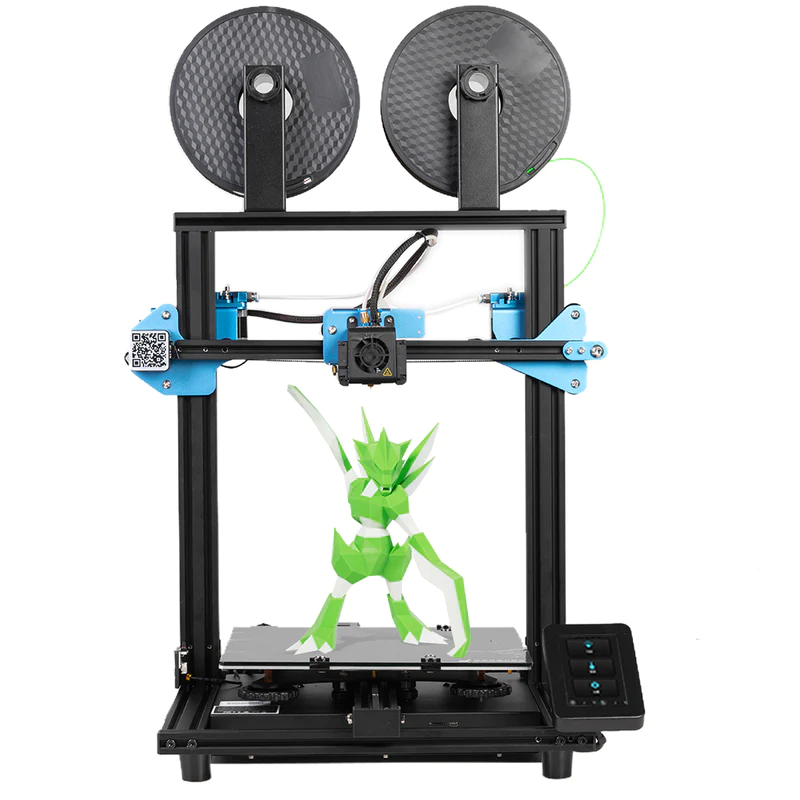Compare A1 Mini vs SV02
Comparison between the best 3D printers
Choose the best 3D printer at the best price. The cheapest 3D printers are here.
Buy a 3D printer here with 3D Fila.
 |
 |
|
| Model | A1 Mini |
SV02 |
| Printing Material | Filament | Filament |
| Buy Filament for Bambu Lab A1 Mini | Buy Filament forSovol SV02 | |
| Estimated price | $549,00 | $209,00 |
| Manufacturer | Bambu Lab | Sovol |
| Release Year | 2023 | 2020 |
| Print Volume [mm] | 180x180x180 | 280x240x300 |
| Printer Size [mm] | 315x347x365 | 539x493x710 |
| Weight [kg] | 5,5 | 11,86 |
| Power Loss Recovery | YES | YES |
| Enclosed printer | NO | NO |
| Bed Leveling | Automatic | Manual |
| Filament End Sensor | YES | NO |
| Bed type | Heated | Heated |
| Power supply system | Direct Drive | Bowden |
| Standard nozzle | 0,4 | 0,4 |
| Maximum Nozzle Temperature [°C] | 300 | 260 |
| Maximum Bed Temperature [°C] | 80 | 110 |
| Maximum printing speed [mm/s] | 500 | 120 |
| Filament holder | YES | YES |
| Camera for supervision | YES | YES |
| Recommended filaments | PLA, PETG, TPU, PVA | PLA, PETG, Tritan, Flex, ABS |
| Recommended slicers | Bambu Studio, Super Slicer, Cura, Prusa Slicer, Orca | Cura, Simplify, Slic3r, IdeaMaker |
| Maximum Resolution [mm] | 0,1 | 0,1 |
| Processor | 32-bit Silenciosa | |
| Display | Touchscreen 2,4'' | Display touchscreen 4,3'' |
| Power Supply | 150 W | |
| Connectivity | Wifi, Bambu bus, Cartão SD | SD / USB |
| Operating systems | Windows, Linux, Macbook | Windows, Mac, Linux |
| Date of registration in the system | 2024-04-10 | 2022-11-10 |
| Release date | 2023 | 2020 |
| Extra features | The Bambu Lab A1 Mini stands out not only for its impressive speed and automatic calibration, but also for its multi-color printing capability thanks to AMS Lite. This innovative system makes multi-color printing easy, making it accessible to everyone. AMS Lite, specific to the A1 Mini, supports up to four different materials simultaneously, providing creative freedom without complications. With comprehensive sensors for energy monitoring and recovery, a camera for timelapses and Wi-Fi control, the A1 Mini and AMS Lite together offer an intuitive and advanced 3D printing experience, ideal for materials such as PLA, PETG and TPU, and designed for simplicity and fast maintenance with quick-change nozzles. | The Sovol SV02 is a dual extrusion 3D printer with two inputs and one output hotend, silent motherboard and 4.3" color touchscreen. It includes a tempered glass platform for glue-free adhesion, dual Z-axis for more stability, and fast heating with Mean Well power supply. It has a resume printing function and support for upgrades, such as an automatic leveling sensor. |
| Support for multiple colors and materials (AMS and CFS) | YES | NO |
Notes * |
||
| Cost-benefit | 7 / 10 | 7 / 10 |
| Hardware | 4.8 / 10 | 1.5 / 10 |
| Tela | . | . |
| Print volume | 3 / 10 | 4 / 10 |
| Performance | 4 / 10 | 1 / 10 |
Conclusion |
| In comparing the **Bambu Lab A1 Mini** and the **Sovol SV02**, it's evident that each printer caters to distinct user needs and preferences, offering unique advantages and compromises. The **Bambu Lab A1 Mini** emerges as a more advanced option, distinguished by its high printing speed, automatic bed leveling, and multi-color printing capabilities through its AMS Lite system. Its performance is particularly suited for those who prioritize efficiency and versatility in materials, making it ideal for users looking for a user-friendly, high-tech experience. The inclusion of a filament end sensor and a robust connectivity suite (including Wi-Fi) further enhances its appeal, especially for digital-savvy users. Conversely, the **Sovol SV02** provides a commendable balance between features and value, particularly for those who may prioritize a larger print volume over speed. It offers a dual extrusion capability, which is beneficial for complex projects that require multiple materials, albeit with some manual setup. While it lacks certain advanced features like a filament end sensor and relies on manual bed leveling, its more affordable price and substantial print volume make it a practical choice for beginners or hobbyists who are comfortable with hands-on adjustments. Ultimately, the decision between these two models hinges on the user’s specific needs: the A1 Mini is best for those seeking rapid, multi-material printing with ease of use, while the SV02 caters to users who value larger print sizes and are willing to trade off some automation for affordability. |

